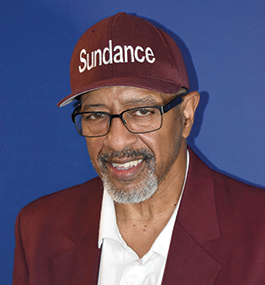A Conscious Focus on the Commonalities

Courtesy Gary Clay
Gary Clay ’80
Gary Clay ’80 — his friends, family, and classmates call him Sundance — is a modern Renaissance man. He spent decades working as a coach, teacher, school social worker, school administrator, and juvenile justice advocate, then became a poet, playwright, and comedic actor.
Now he’s added yet another job title to his CV: In July, he joined the Brandeis University Alumni Association’s board of directors, one of seven new members welcomed in 2022.
Clay still marvels at his fortuitous path to Brandeis after high school. The proud product of Boston housing projects and public schools, he had a Mensa-member mom who stressed the value of education. Even so, “I didn’t plan on college,” he says. “I was smart, and I had the IQ tests to prove it. But in the mid ’70s, Black-white relations weren’t the best in Boston, especially in academic settings.”
Fortunately, he found mentors who spurred him on. “My high school guidance counselor, who was white, taught me that before you can correct, you must connect,” Clay says. “He’s the one who encouraged me to attend Brandeis.”
When Clay came to Brandeis as part of the Myra Kraft Transitional Year Program, basketball coach Bob Brannum became a big part of his life. “Bob recruited me to the varsity basketball team, supported me, and believed in me,” he says.
Clay, who double-majored in sociology, and African and African American studies, developed his own supportive approach.
“My passion has always been helping youth,” he says. “As a teacher, I wanted to help the ones with the labels, the middle schoolers having a tough time. That’s how my poetry developed — I had to find a different way to reach them.” He saw a parallel between rap lyrics and poetry, and believed his students might respond to the rhymes he wrote. They did.
Clay recently self-published a book titled “Power Poems: Words That Impact.” He’s also developing a screenplay tentatively called “The Kosher Line,” rooted in the lessons he learned at Brandeis about the ties between the Black and Jewish communities, experiences that shaped the core of his humanistic outlook.
Clay’s desire to nurture relationships between people is a big reason why he’s thrilled to be on the Alumni Board. “I’m compelled to try to bridge gaps between groups and focus on the commonalities,” he says. “I want to pay it forward. It takes only one person to change your life, and I try to be that person every day.”
— Anne Lawrence Guyon
